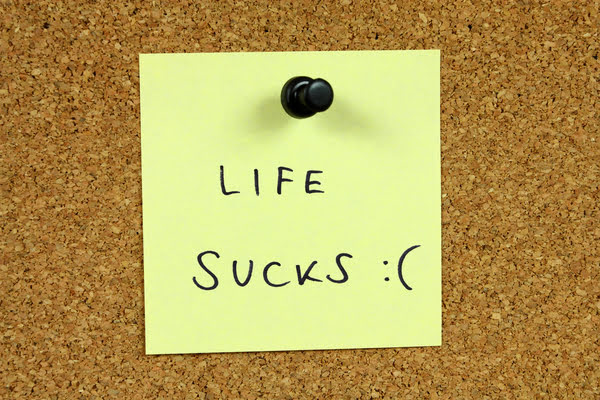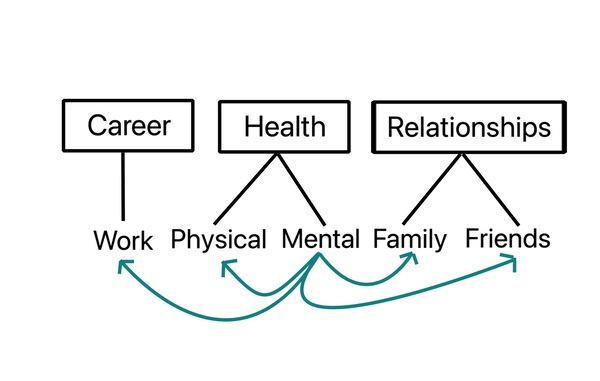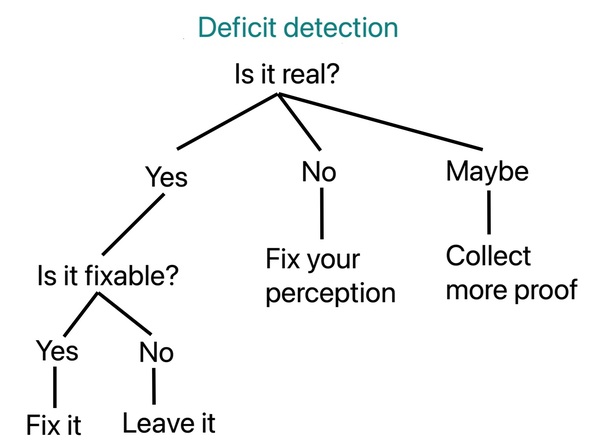What goes on in the mind of a person who says their life sucks?
Does their life really suck, or are they being negative?
There’s a lot to clarify in this article. Let’s begin.

Let’s start with the basics. Like other organisms, humans have the core biological needs of survival and reproduction.
Stated differently, humans want to be good in their careers, health, and relationships. Others talk of multiple (sometimes 7) life areas, but I like to keep it simple: Career, Health, and Relationships (CHR).
If there are deficits in these life areas, they make us tremendously unhappy, and we believe our life sucks. When we make progress in these life areas, we feel happiness.
Deficit examples
Deficits in Career:
- Not being able to find a job
- Getting fired
- Losing a business
Deficits in Health:
- Getting sick
- Mental health issues
Deficits in Relationships:
- Break-ups
- Divorce
- Estrangement
- Loneliness
- Friendlessness
All three life areas are equally important. Deficits in any of these life areas cause serious mental disturbance and unhappiness.
Our brain is essentially a machine that evolved to keep tabs on these life areas. When it detects a deficit in one or more areas, it alerts us via unhappiness and pain.
The pain motivates us to do something and improve our CHR.
The brain allocates our time, energy, and resources efficiently so any one life area doesn’t go too low.

In a previous article about getting your life together, I used the analogy of buckets. Think of your three life areas as buckets that must be filled to a certain level.
You only have one tap, and your brain is controlling that tap. Your tap is your time, energy, and resources. The more you fill a bucket, the more you ignore other buckets.
If you over-focus on one bucket, others get drained because the buckets have leaks in them and are to be constantly filled. The rate of filling the buckets has to be greater than the rate of leaking (pardon my engineer mind).
So you have to rotate filling them so they’re all filled to decent levels.
This is the main reason why life can get so complicated.
You over-focus on your career and see your relationships and health slip away. You over-focus on health, and your career and relationships suffer. You over-focus on your relationships; your career and health aren’t up to the mark.
If you focus on all three life areas, you spread yourself thin. Sure, you’ll be average in all the areas, but you probably won’t be exceptional in all three. It’s up to you to decide what you’re willing to sacrifice and to what extent.
Personality needs
We have a layer of personality needs on top of our biological needs. The six core personality needs are:
- Certainty
- Uncertainty
- Significance
- Connection
- Growth
- Contribution
Based on your childhood experiences, you had positive associations or deficits in these personality needs. So, in adulthood, you lean more toward some of these buckets. Yes, these are buckets, too, that you have to fill.
For example, growth and personal development may be big for you because you felt inadequate or insecure in the past.
For someone else, significance and being the center of attention may be a big bucket because they were constantly showered with attention in childhood. They have positive associations with attention-seeking.
If you look closely, our personality needs really boil down to our biological needs. Significance, Connection, and Contribution are all about Relationships. Certainty (security), Uncertainty (risk-taking), and Growth improve our chances of survival.
Our past experiences explain why some of us lean more toward one life area than another. Doing that is called having core values. Having values, by definition, means favoring one thing over another.
And favoring one thing over another is bound to create deficits in another. Since the mind is designed to detect deficiencies, you’ll be unhappy even if you live up to your values.
You’ll probably be even more unhappy if you don’t.
Remember, the things you value are larger buckets to fill. It’s going to hurt more if you don’t fill a larger bucket than if you don’t fill a smaller bucket.
Unfortunately, the mind doesn’t care that much about filled buckets. It only cares about unfilled ones. Even if you do incredibly well in one life area, it will constantly alert and pinch you about the deficits in other areas.
So, unhappiness is the default state in humans.
We naturally focus on where we want to go, not how far we’ve come.
On becoming a realistic thinker
I laugh internally when I hear people say:
“I’m living the life I want.”
No, you’re living the life your biological and personality needs have programmed you to live. If you have values, why don’t you question where those values came from?
By understanding why we are the way we are, we get clarity about what we should and shouldn’t do.
Don’t you find it relieving knowing that your mind will always focus on deficits instead of what you’ve gained?
I do. I don’t try to think positively or maintain a gratitude journal. I let the mind do its job. Because the mind tends to do its job well. It’s the product of millions of years of evolution.
So when I over-focus on work, and my mind implores me to take a break for my health, I listen.
I let my mind use my tap the best it can. I don’t grab the tap from my mind’s hand and scream, “I’ll do what I want.” Because what I want and what my mind wants is the same. We’re allies, not enemies.
This is the essence of realistic thinking, something that I highly recommend.
Positive and negative thinkers both tend to be biased. Realistic thinkers constantly check whether or not their perceptions align with reality, irrespective of whether that reality is positive or negative.
If your life sucks, your mind is detecting deficits in your CHR and/or personality needs. Are these deficits real? Or is your mind over-detecting deficits?
If it’s the former, you have to take steps to improve the life area you’re lagging in. If it’s the latter, you have to show proof to your mind that it’s ringing a false alarm.
Example scenarios
Scenario 1
You’re scrolling social media and see that your friend from college is getting married while you’re still single. You feel bad because your mind has detected a deficit in Relationships.
Is the deficit real?
You bet it is! Seeking a partner is a good solution to this problem.
Scenario 2
You called your partner, and she didn’t pick up your phone. You think she’s deliberately trying to ignore you. Getting ignored by someone who matters to you is a deficit in Relationships.
Is the deficit real?
Maybe. But you have no way to be sure. You’re assuming a deficit that may or may not be valid. What if she’s in a meeting or is away from her phone?
Scenario 3
Say you’re learning a new career skill and aren’t progressing. You feel bad because your mind has detected a deficit in your Career.
Is the deficit real?
Well, yes, but there’s something you can do to silence the alarm bells in your mind. You can remind yourself that failure is part of the process of learning. You can provide examples of people who failed starting out and succeeded eventually.
When you’re doing this, stick to facts and reality. You really can’t fool your mind with positive thinking. If you suck, you suck. There’s no point trying to convince your mind otherwise. Prove it with progress.

True acceptance
True acceptance happens when your mind knows there’s nothing you can do to fix your situation. The whole point of sadness and alarm bells is to motivate you to take action. When you truly can’t take any action, you accept your fate.
Acceptance isn’t easy because the mind is relentless in pushing you to take action to improve your situation.
“Maybe you should try this?”
“Maybe that will work?”
“How about we try this?”
This constant mind-spamming can only be stopped when you genuinely understand there’s nothing you can do.
